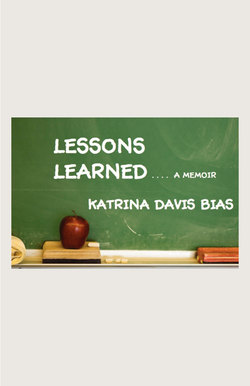Читать книгу Lessons Learned - Katrina Davis Bias - Страница 8
На сайте Литреса книга снята с продажи.
Merinel—another mother
ОглавлениеPerhaps my first mentor was Merinel. She was married to my dad’s best friend Ezie and lived five houses down from us on Stanford. Growing up, I saw her nearly every day.
Merinel was a few years younger than my mom and glamorous. Her hair was dyed red and she smoked long Hebert Tareyton cigarettes. She was artistic and shared with me her sewing and home decorating skills. She had gone to college, had no children nor did she work, which was a phenomenon in our neighborhood. She had a toy poodle that wore bows; the fact that the dog, Ribbons, stayed inside the house was another phenomenon.
Merinel made jokes and kept a straight face. We had to pay close attention to be sure it was a joke. An example: if Michael complained that he didn’t have anyone to play with, she would tell her son to go play at the Jones’ house, saying since they had ten kids he was bound to find a playmate.
We played table games at both houses. Checkers, dominoes, tonk, canasta, whist, black jack, and monopoly were our favorites. Tonk is a game I thought everyone knew, but have found that white people aren’t familiar with it. Tonk is a card game with discards, similar to gin rummy. It has subtle nuances and requires verbal taunts towards one’s opponents. Whist is another game I thought was common until my white friends asked, “What’s whist”? It is similar to bridge and requires bidding on how many books you and your partner might make. It too requires subtle nuances and taunting your opponents. I guarantee everyone who attended college with more than four black students in the population has played whist.
Having been friends since boyhood, Ezie and my Dad spent a lot of time together, playing dominoes and tonk after work and during their free time on week-ends. I tagged along to keep score and observe, picking up the nuances of the games.
One Saturday night a month was saved for time when the two families got together. Alternating houses each month, the adults played canasta or whist. Dad’s enchiladas or gumbo or Ezie’s barbeque were some of the special meals they served on these special Saturdays. We kids hung out watching TV, observing, or helping with the refreshments and dinner. Neither these friends nor any of my family’s friends were drinkers, so we did not experience any of the unpleasantness that some families had to endure when too much drinking led to ugliness. I have wonderful memories of these nice Saturday evenings.
After school and summers I hung out at Merinel’s house where I helped her make and sew beautiful children’s clothes that she designed and sold to neighborhood ladies. Sometimes she had fashion shows and my sister Sondra was her favorite model. I was recruited to help during the crunch of finishing garments before a show.
We sometimes ate breakfast with Merinel, including buttered toast. For years Roscoe tried to make his toast taste like Merinel’s but could not. Later he found that the secret was the use of butter rather than the margarine we used.
Merinel was patient in teaching me things. I helped with her flat ironing, for which she had an ironing machine that was quite a contraption. I had trouble putting the sheets into the roller and operating the knee pedals. When teaching us something she would first let us try on our own. When it didn’t work out right, she’d, say, “This is how you do it.” and we’d try again, as she offered suggestions as we went along. In pedagogy, this is the perfect teaching technique.
During my teen years, I wrapped her Christmas gifts, since I had been a “professional” wrapper at Bullock’s Department Store. Our two families exchanged gifts. One of our families had purchased a pre-tied bow that could be attached to a package, which was a luxury in the 1950’s. We saved the bow and put it on one of their packages, the next year they did the same for our packages. That little bow traveled between our two homes for about ten years.
Whenever we drive home, we had to pass their house and Dad always said hello by tapping his horn twice while passing. As soon as I was driving, I continued this salute. I tapped my horn for forty more years, whenever I came back see Mom.
Merinel and Ezie had children when I was a teen-ager. I was their baby-sitter. Their son, Michael was an only child for a long time and he considered himself our brother. He says he had to count on us because a kid without siblings was picked on. Later his two brothers were born close together. We always joked that Merinel and Ezie couldn’t figure out how to have any more kids, but when they did, it really worked.
Ezie worked for a fashion house and they needed their new line pressed and prepared before displaying the dresses for the buyers. Ezie told them he had just the girl to do this. I went to their showroom downtown in the garment district for about a week and pressed beautiful dresses for eight hours a day. Sometimes I was there when buyers dropped by before the show and I heard their conversations about fashion. It was like getting paid to attend a preview fashion show.
Ezie passed away recently and Merinel is not able to get around easily. I drive to her home and spend the day visiting with her at least once each year.
She was like a second mother to me and I learned from her spirit, which today is the same as always: fun, patience, and style.
Merinel Thrash, circa 1990
